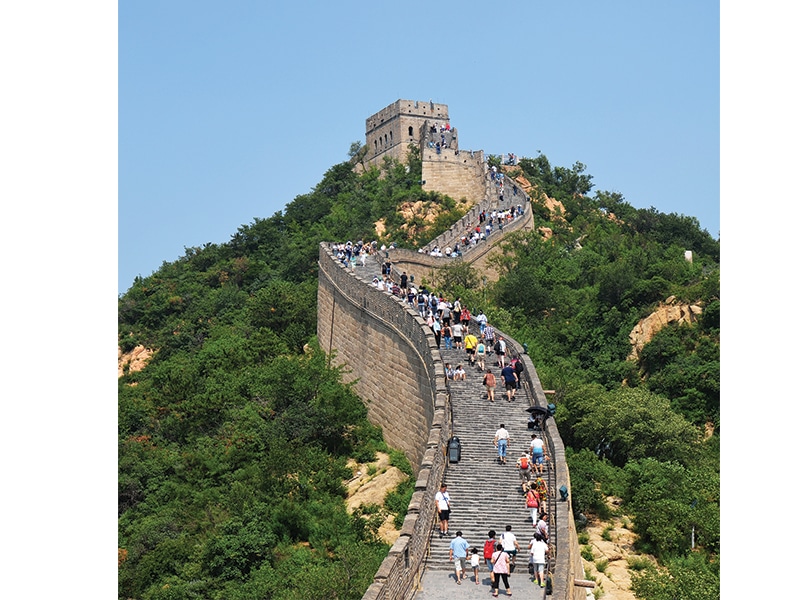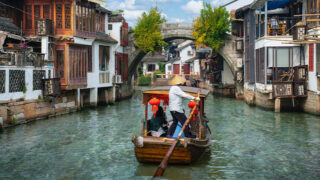China is a fascinating country, from its atmospheric old towns and historic sites to the marvel of its massive metropolises. It’s a huge place with a wealth of destinations to choose from; you can enjoy spicy food and panda-watching in Sichuan, laze on the beach in Sanya, explore the old French Concession of Shanghai, or head to Xi’an to marvel at the Terracotta Army – and so much more! We’ve compiled some of the basic information you need to know before you head to China, covering visas, money, language, weather and other important details.
The basics
Population: 1.45 billion
Capital: Beijing
Religion: Chinese folk religion, Confucianism, Taoism and Buddhism, usually practiced in combination with one another
Emergency numbers: 110 (police), 119 (fire), 120 (medical)

Fact File
- The Chinese invented paper, the compass, gunpowder and printing. Toilet paper was also invented in China in the late 1300s, for the use of emperors. Fortune cookies, however, are not a Chinese invention; they first appeared in the early 1900s, in San Francisco. And while ping pong is among the most popular sports in China, it originated in Britain as table tennis.
- The Forbidden City complex in Beijing contains something like 9,000 rooms!
- On the Lotus Bridge that links mainland China and Macau, cars switch from left to right-hand drive and vice versa.
- Sticky rice was used to reinforce the mortar during the construction of the Great Wall.
- In the district of Datang in Zhuji, also known as “sock city”, one third of the world’s socks are produced.
- Pandas are good swimmers.
Key dates
- Chinese New Year. From the first to the 15th day of the lunar New Year is a time for visiting friends and relatives. It’s the biggest migration of people in the world, so be prepared for overwhelming crowds, noise and fireworks.
- Dragon Boat Festival. Try a zongzi rice dumpling while watching the dragon boat racing.
- Mid-Autumn Festival. Another family reunion holiday; admire the full moon and sample mooncakes.
Hot spots and itineraries
Popular destinations include Beijing, Suzhou, Shanghai, Chengdu, Hong Kong, Macau, Xi’an, Sanya, Lijang and Tibet. There are more than 50 World Heritage Sites, including the Great Wall, the Potala Palace in Lhasa, and the Temple of Heaven in Beijing.
Some itinerary ideas
- The Big Three: Beijing – Shanghai – Xi’an (terracotta warriors)
- Natural Beauty: Shanghai – Hangzhou – Huangshan – Guilin
- The West: Beijing – Urumqi – Kashgar
- Sichuan & Yunnan: Chengdu – Shangri-La – Dali – Lijiang
- The South: Guangzhou – Shenzhen – Hong Kong – Macau – Sanya
Staying safe and healthy
- The high levels of air pollution in major urban and industrialised areas can aggravate bronchial, sinus or asthma conditions. Check pollution index levels at aqicn.info. A reading of 300 and above is considered extremely polluted, and several cities including Beijing regularly exceed this number.
- Rabies occurs throughout China, so you’re best to avoid contact with animals – even the cute ones!
- Buy bottled water, don’t drink it from the tap.
Cultural things
While you’re there, please don’t…
… leave your chopsticks sticking upright in your rice bowl. Doing so is likened to a shrine with two sticks of incense stuck upright in it; it’s pretty much the equivalent of wishing death upon the person at the table! Instead, lay them on your dish.
Before you go, read …
- Soul Mountain by Gao Xingjian – Nobel prize-winner’s fictionalised memoir about a journey along the Yangzi River.
- Country Driving by Peter Hessler – detailing an American author’s several long journeys by car through rapidly changing China.
- China in 10 Words by Yu Hua – an insightful collection of essays by a contemporary Chinese author.
Before you go, watch …
- Raise the Red Lantern – a bold and colourful drama by Zhang Yimou (who directed the opening ceremony of the Beijing Olympics) set in the 1920s; it tells the story of a concubine to a wealthy warlord.
- City on Fire – this 1987 Hong Kong crime thriller, starring Chow Yun-fat, is said to have inspired Quentin Tarantino’s Reservoir Dogs.
- Skyfall – for a view of Shanghai and Macau through James Bond’s eyes.
They said it
- “It doesn’t matter if a cat is black or white, so long as it catches mice.” – Deng Xiaoping
- “Let her (China) sleep, for when she wakes, she will shake the world.” – Napoleon Bonaparte
- “Give a man a fish, and he’ll eat for a day. Teach him how to fish and he’ll eat forever.” – Chinese proverb
Important questions

Do I need a visa?
Almost all visitors to China need a visa. There are some exceptions, including citizens of Singapore, Japan, several European countries who aren’t intending to stay for a certain period (15 or 30 days, depending on nationality). For further information, visit the Visa for China website.
What time is it in China?
Beijing is eight hours ahead of GMT, the same time as Singapore, and two hours behind Sydney. China’s far western regions use an unofficial time that is two hours behind Beijing.
What’s the money situation?
The official currency in China is the renminbi (RMB); the basic unit of this currency is the yuan. Credit card use is largely limited to high-end hotels, restaurants and shops so your best bet is to carry cash. You’ll find ATMs in most major towns throughout the country.
When’s the best time to visit?
Weather varies enormously depending on the location, but in general the middle of spring and autumn are pleasant times to go. We don’t recommend you travel during the “Golden Week” holiday at the beginning of October, since half the country will be lining up to get trains and buses too! It can be bitterly cold between December and February, especially in the north, where temperatures get down to minus 40 degrees Celsius. Hong Kong’s best weather is generally from March to May and November to December.
What’s the lingo?
The official language of China is Mandarin. Cantonese is the other main language, serving as the predominant language of Hong Kong, Macau and Guangdong Province. Here are some phrases to get you started:
- Hello – Ni hao
- What is your name? – Ni jiào shénme míngzi?
- My name is __ – Wo jiào __
- How much? Duoshao?
- Thank you – Xiè xie
- Yes – Shì de
- No, thank you – Búyào xièxie
Last but not least
Is there anything I should know about meeting the locals?
A handshake is the formal way of greeting people in China, but it tends to be a less firm shake than you may experience in many Western countries.
What’s a must-try dish?
Peking duck – roasted duck meat and strips of crispy duck skin topped with scallions and a sweet sauce and wrapped in thin pancakes.
What should I buy as a souvenir?
Porcelain from Jingdezhen, green tea, calligraphy scrolls, ornate chopsticks.
Read more in our Travel section!





